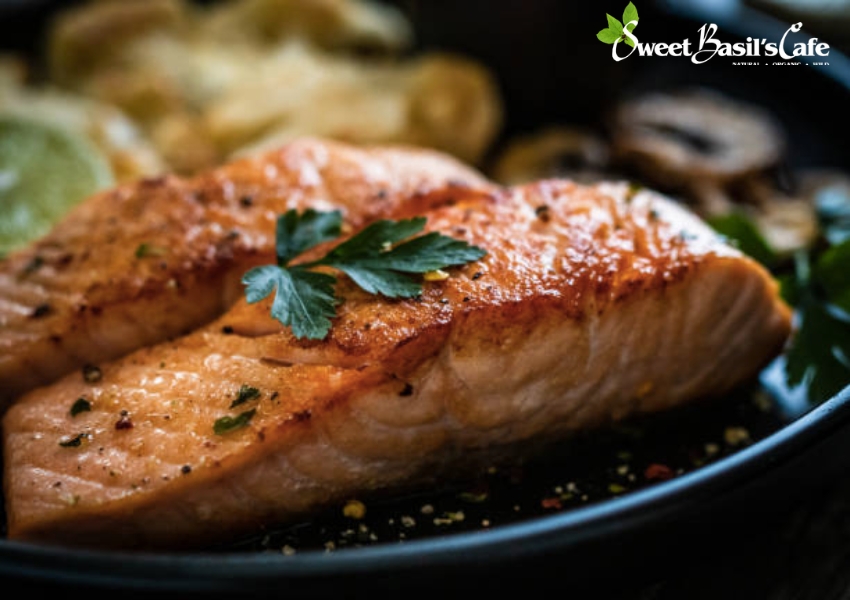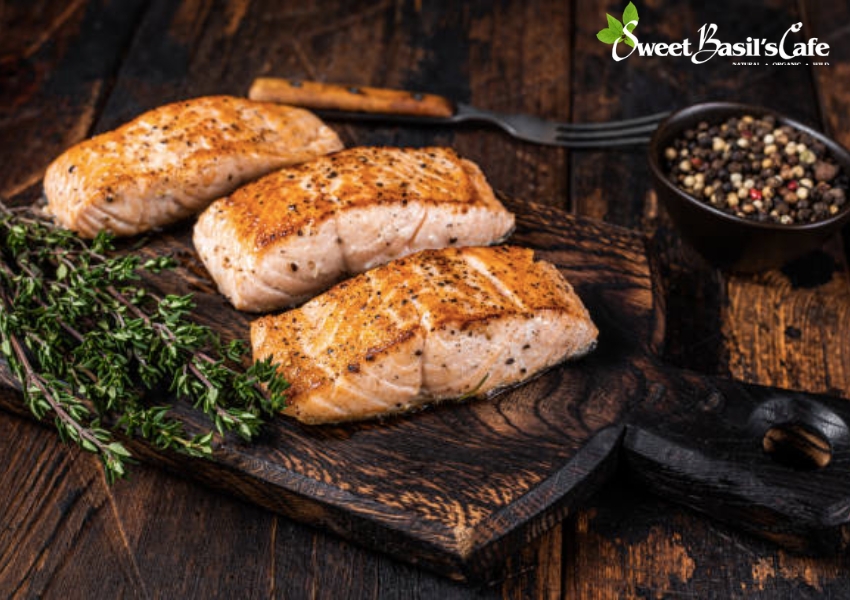How Long Does Cooked Salmon Last In The Fridge

Salmon is a popular fish that can be cooked in many different ways. But once it’s cooked, how long does cooked salmon last in the fridge? In this blog post, I’ll explore the shelf life of cooked salmon and provide some tips for keeping it fresh. So, cooked salmon is a healthy and delicious addition to any meal! Read on to learn more how long to store it!
How Long Does Cooked Salmon Last In The Fridge and Why?
Cooked salmon will last in the fridge for up to 4 days when stored properly. This is because cooked fish is perishable and can quickly become unsafe to eat due to bacterial growth. To prevent food-borne illness, it’s important to store cooked salmon correctly and consume within a few days of cooking.
Important Notes For Storing Salmon At Room Temperature
Never leave cooked salmon out at room temperature for more than 1 hours. Bacteria can quickly multiply and spoil the fish, making it unsafe to eat. If you’re planning to serve cooked salmon within a few hours, keep it in a cooler with ice packs until ready to eat.
Can Cooked Salmon Last Longer If Storing Them In The Freezer?
Yes, cooked salmon can last longer in the freezer. If stored properly, cooked salmon can last up to 2-3 months in the freezer. To extend its shelf life, wrap the fish tightly in air-tight packaging such as plastic wrap or aluminum foil before freezing. When ready to consume, thaw the frozen salmon overnight in the refrigerator and cook it the same day.
What To Know About Thawing Cooked Salmon
When thawing cooked salmon, do not leave it in the refrigerator for more than 1-2 days. Doing so can cause spoilage and food-borne illness. Instead, always thaw your frozen cooked salmon in cold water or the microwave before cooking.
Essential Guide To Store Cooked Salmon
Cooking salmon at home is a healthy and easy way to prepare a delicious meal. This guide will teach you how to store cooked salmon so that it remains fresh for up to four days. Salmon is a nutrient-rich fish that is high in omega-3 fatty acids, vitamin B12, and selenium. To store cooked salmon, follow 2 simple methods:
Method 1: Storing In The Fridge
- Place cooked salmon in an airtight container and store it in the coldest part of the fridge.
- Use within 4 days of cooking.
Method 2: Storing In The Freezer
- Wrap cooked salmon tightly in air-tight packaging such as plastic wrap or aluminum foil before freezing.
- Store frozen cooked salmon for up to 2 months in the freezer.
- When ready to consume, thaw frozen cooked salmon overnight in the refrigerator and cook it the same day.
Tips For Storing Cooked Salmon
- Always store cooked salmon in an airtight container in the refrigerator.
- Never leave cooked salmon out at room temperature for more than 1 hour.
- If storing cooked salmon in the freezer, wrap it tightly in air-tight packaging before freezing.
- When thawing frozen cooked salmon, do not leave it in the refrigerator for more than 1-2 days.
- Always thaw frozen cooked salmon in cold water or the microwave before cooking.

4 Easy Ways To Tell Your Cooked Salmon Are Spoiled
There are a few telltale signs that your cooked salmon has gone bad.
- Using Your Nose To Smell: If your cooked salmon has an off-putting odor, it’s likely gone bad.
- Using Your Eyes To See: If the cooked salmon has changed color from its original pinkish hue or started to develop a slimy texture, discard it.
- Using Your Hands To Touch: If the cooked salmon feels mushy or soft to the touch, discard it.
- Using Your Mouth To Taste: If the cooked salmon tastes off or has a bitter flavor, discard it.
How To Choose High-quality Fresh Salmon
The best way to ensure you are buying high-quality fresh salmon is to look for the Marine Stewardship Council’s label of approval. This label indicates that the fish has been sustainably caught and of high quality. Additionally, look for salmon with firm flesh, a vibrant color, and a mild, pleasant scent. Avoid salmon that has slimy skin, discolored flesh, or an unpleasant odor.
Before cooking fresh salmon, also be sure to check for any bones that might have been missed during the filleting process.
Salmon Appearance Guide
Fresh salmon has a bright pinkish-orange hue, firm flesh, and a mild, pleasant scent. Cooked salmon has an opaque white hue and a moist, flaky texture. If the salmon has changed color or started to develop a slimy texture, it is likely spoiled and should be discarded.
Salmon Smell Guide
Fresh salmon should have a mild, pleasant smell. Cooked salmon should not have an overly fishy odor. If it does, discard it. When buying fresh salmon, always check the sell-by date and make sure it is not expired. Also be sure to inspect the fish for signs of spoilage such as discolored flesh, slimy skin, or an unpleasant odor. If any of these signs are present, discard the salmon.
Salmon Texture Guide
Fresh salmon should have firm flesh and a moist, flaky texture. Cooked salmon should not be mushy or soft to the touch. If it is, discard it. Finally, always avoid refreezing cooked salmon as this can cause bacteria growth
For Choosing Frozen Salmon
When purchasing frozen salmon, look for packages that are clearly marked as “fresh” or “quick-frozen.” Avoid any packaging with freezer burn or ice crystals. Always check the sell-by date and make sure it is not expired before buying. Additionally, inspect the fish for signs of spoilage such as discolored flesh, slimy skin, or an unpleasant odor. If any of these signs are present, discard the salmon.
Cooking Salmon Cannot Get Easier With 8 Methods
Salmon is a popular fish that is often eaten by people who are looking to improve their health. While some individuals may choose to grill or bake the salmon, others will pan fry it. Regardless of how you cook the salmon, it cannot get easier than with these 8 methods! You can even try a few of them at once for a unique and delicious dish!
1. Pan-Fried Salmon
This is a classic way to cook salmon. All you need to do is season the salmon, heat some oil in a skillet, and add the salmon. Fry it about 5-6 minutes until it’s golden brown on both sides.
2. Roasted Salmon
This is a great way to cook salmon if you want it to stay juicy and tender. Simply season the salmon, arrange on a baking sheet, and roast it in the oven for about 8-15 minutes at 425F.
3. Broiled Salmon
Preheat the broiler, brush the fish with olive oil, place it on a baking sheet, and broil for around 3 minutes.
4. Grilled Salmon
Grill your salmon steaks directly over medium-high heat for around 5 minutes each side or until the flesh flakes easily.
5. Poached Salmon
Place the seasoned salmon in a shallow pan and cover it with boiling water or broth. Simmer about 5-6 minutes depend on size of your fish until desired doneness.
6. Pan-Seared Salmon
Coat your pan with olive oil and heat it over medium-high. Once the oil is hot, place your salmon in the pan and sear each side for around 3-4 minutes.
7. Salmon en Papillote
En papillote is a French cooking method that involves baking food in parchment paper. Place the seasoned salmon on a piece of parchment, top with your favorite vegetables, and fold in the edges. Bake for around 12-15 minutes in a preheated oven.
8. Baked Salmon With Foil
Arrange your seasoned salmon on a piece of foil and top with vegetables. Close up the edges of the foil and bake in a preheated oven for around 15-20 minutes.
FAQs
Can I Eat Salmon 5 Days After Cooked?
No, it is not recommended to eat cooked salmon more than 3-4 days after cooking as bacteria may start growing.
Is It Safe To Eat Cooked Salmon 3 Days Old?
Yes, it is generally safe to eat cooked salmon up to 3 days after cooking if stored properly. It is important to check the color, texture, and smell of the salmon before eating to make sure it is still safe to consume.
Can I Eat Cooked Salmon After 2 Weeks?
No, it is not recommended to eat cooked salmon after more than a couple of days as bacteria may start growing and make the salmon unsafe to consume. It is best to discard any cooked salmon that is more than 2 weeks old.
Can You Get Food Poisoning From Cooked Salmon?
Yes, it is possible to get food poisoning from cooked salmon if it has been stored improperly and bacteria growth has occurred. Always check the color, texture, and smell of cooked salmon before eating to make sure it is still safe to consume. It is also important to cook the salmon thoroughly according to instructions.
What Happens If I Eat Week Old Cooked Salmon?
Eating week old cooked salmon can cause food poisoning if bacteria have grown on it and made the salmon unsafe to consume. Always check for signs of spoilage, such as a slimy texture or an unpleasant odor before eating. If any of these signs are present, discard the salmon.
Is It Safe To Reheat Cooked Salmon?
Yes, it is generally safe to reheat cooked salmon, as long as it has been stored properly. To be on the safe side, always check the color, texture, and smell of the salmon before reheating to make sure it is still safe to consume. It is also important to heat the salmon thoroughly in order to kill any bacteria.
Is Salmon Good After 5 Days In The Fridge?
No, it is not recommended to eat cooked salmon more than 3-4 days after cooking as bacteria may start growing. Therefore, salmon should not be eaten after 5 days in the fridge. If you are unsure, it is best to discard the salmon and avoid any potential health issues.
Conclusion
The answer to the question of how long cooked salmon will last in the fridge is that it can last up to four days. However, there are a few things you should keep in mind if you want your cooked salmon to stay fresh for as long as possible. First, make sure that your salmon is stored in an airtight container or bag. Second, place the salmon in the coldest part of your fridge. Finally, consume or freeze the salmon within four days of cooking it. Have you ever cooked salmon before? What tips do you have for keeping it fresh? Let Sweet Basil’s Cafe know your thinking!
